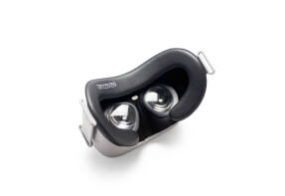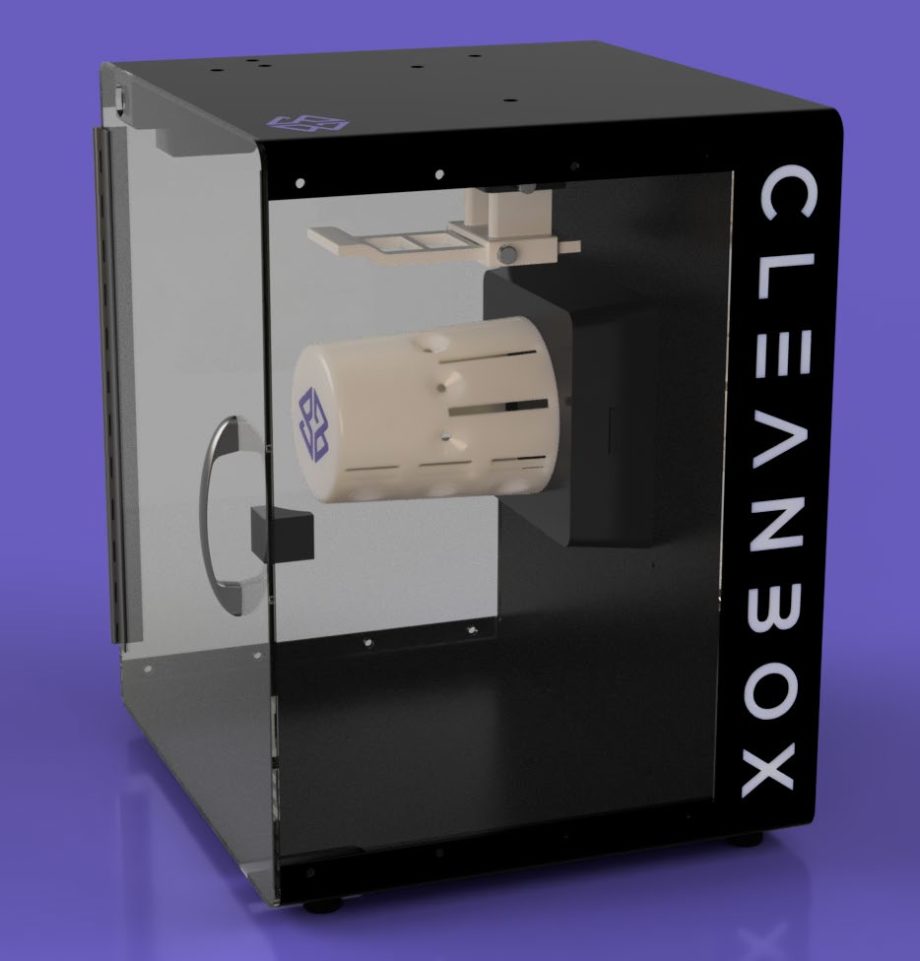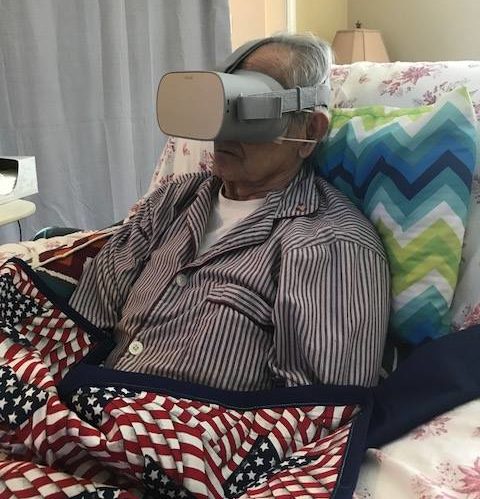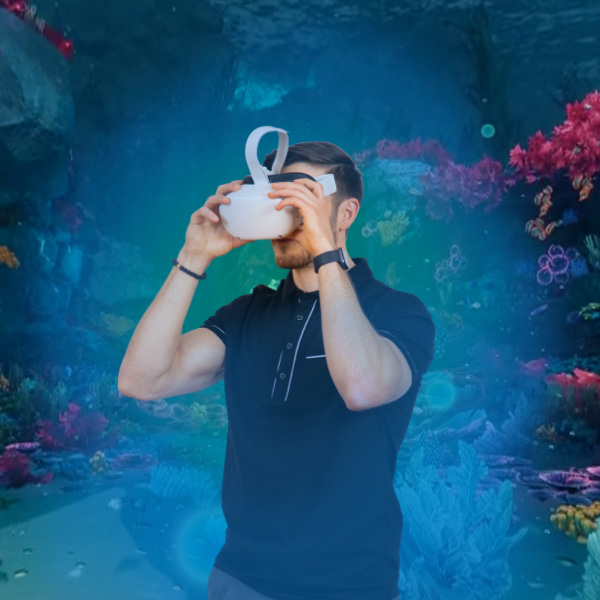




Wipeable Straps & Facial Interfaces for VR goggles: vrcover.com/product/oculus-go-head-strap
Disposable liners: https://vrcover.com/product/disposable-hygiene-cover/

Cleanbox Technology delivers state-of-the-art smart tech hygiene solutions for disinfecting AR/VR HMDs, Communication Headsets, Small Electronics, Eyewear & Masks.
Independent lab testing recently undertaken at a Biohazard Level 3 lab shows that Cleanbox UVC engineering kills SARS-CoV-2 (COVID-19) on surfaces and on masks. Tests done on N-95 masks show a 99.9% efficacy after 60 seconds and 99.999+% (log 5+) after a two-minute cycle. Cleanbox uses UVC (UltraViolet C) to in 60 seconds destroy 99.99+% of viruses, germs, and bacteria on all parts of VR headsets that sit closest to the eyes, nose, and mouth, which are the major contagion points.

If you have a Cleanbox, spray the headset with nanotech anti-septic that comes with the unit and place the VR headset along with the VR cover in the Cleanbox. The cleanbox uses UVA and UVB light to clean the headsets (1 headset per min.)
Put on clean gloves first and then discard the gloves after you’ve finished cleaning the headset. If you don’t have gloves, thoroughly wash your hands or use hand sanitizer before and after cleaning the headset.
If you don’t have a Cleanbox, put on clean gloves and use a PDI sani-cloth wipe (preferably with the gray top). Gently wipe the face mask and around all of the headset surfaces with the PDI wipes and allow to dry for 3 minutes.
If you don’t have a wipeable facemask from VR Cover, this is not ideal but you can clean the cloth interface with Virex and then set out to dry.
For single users, you can use a can of compressed air to blow dust out of nooks and crannies.
You can clean the lenses using a dry, soft, lint-free cloth. Oculus advises to NEVER use a liquid cleaner on the lenses as it could damage the lenses. However in some institutions, using a dry cloth is not ideal so an alcohol-based lens cleaner is recommended.
CAUTION: Take care as the lens can easily scratch; use a consistent, counter-clockwise motion when cleaning the lenses of the headset. Never store your virtual reality headset in sunlight. Much like a magnifying glass, the sun can burn the lenses creating artifacts in the view.

Put on gloves first and then discard the gloves after you’ve finished cleaning the headset. If you don’t have gloves, thoroughly wash your hands or use hand sanitizer before and after cleaning the headset.
Replace the disposable sanitary cover after each use of the VR headset. Peel off the paper backing behind the cover and stick the disposable barrier on the vinyl face mask that has been cleaned according to the previous protocol.
The vinyl face mask is reusable and can be wiped with sani-wipes and set out to dry for three minutes or preferably put inside the Cleanbox.

I’m working with aging or chronic pain individuals who require assistance with the VR headset. How do I ensure they’re comfortable during the VR Experience?
A virtual reality experience is not for everyone, so it’s important to take certain precautions to ensure the user has an enjoyable experience. Check with the person’s physician or close family members to ensure there aren’t any limiting medical or mental conditions. If the user has a history of seizure or motion sickness, sensitivity to flashing lights, head injury, bipolar, schizophrenia or other psychotic disorder they’re not an ideal candidate for VR. It is also important to know that you can stop the VR session at any point if it is uncomfortable. In addition, the user can always peek below the headset to see their body and the ground in front of them to become reoriented. If they experience any physical or emotional discomfort, it is recommended to discuss this with your host immediately after your VR session. Ask the user if they even want to see virtual reality, explaining the process as best you can. If they don’t want to do it, don’t pressure them. We explain VR to older individuals like a “High Tech Viewmaster”. (Some people used Viewmasters during WWII so they may understand that concept).
In order to prevent any undesirable experiences, the following guidance should be followed by whomever is assisting the user:
NEVER allow the user to stand up while they’re watching a VR experience.
NEVER leave or take your eyes off the individual while they’re watching the experience.
1. Clean the facemask with a hypo-allergenic, alcohol-free antibacterial wipe with the protocol above.
2. Once the steps listed above are complete and the video is ready to play, explain to the user what to expect and if they are having any trouble, to tell you, or give a hand signal so you can help them.
CAUTION: Instruct the user to alert you immediately if they feel uncomfortable or dizzy. Discontinue use (where appropriate) by immediately removing the headset.
NOTE: Instruct the user to use a thumbs up/thumbs down to communicate how they feel. If given a thumbs down signal, immediately remove the headset.
3. Assist the user as they put on the headset.
NOTE: A seated position is ideal if possible, but lying down is acceptable, you will just have to reorient the view outside of the app by holding down the “O” or Pico “home” button.
4. Let the user adjust their own headset, assisting as required until it is comfortably secured with a clear view.
5. In order to focus, ask the user (or assist if needed) to move the headset around their forehead until it’s in focus. The user is also able to wear glasses if that’s easier but not ideal as it may scratch the lenses.
6. Play the video for the user first then place it on their head.
7. Ask the user if they’re able to hear the audio clearly as soon as the experience begins. Headphones are not required as the sound out of the Oculus Go’s built in speakers is really good and works well with hearing aids. Try using the volume buttons on the VR goggles or some of the remote controls also have volume +- buttons.
8. One minute into the film, ask the user if they’re still feeling alright and remind them that they can look all around – Left, Right, Up and Down.
CAUTION: If you see a thumbs down or sense any discomfort in the user, discontinue use immediately by removing the headset.
NOTE: Closely monitor the user’s body language during the duration of the experience to ensure they’re comfortable.
Why aren’t there any headphones supplied?
Headphones greatly enhance the experience however in some instances, we’ve found that headphones can be problematic due to interference with certain hearing aids. The audio output from the headset is close enough to the ears to be clearly heard or picked up by most hearing aids. As such, we recommend the use of headphones only in specific cases when they may be necessary. If the user is not able to hear the experiences with the audio turned all the way up, you might consider using headphones.
Can the user wear eyeglasses?
It’s up to you and the user. Eyeglasses have the potential to scratch the lens of the headset or prove to be a barrier for the viewer. That said, if the user doesn’t want to remove their glasses, it’s not a necessity. Feel free to experiment to optimize the user’s comfort level. In our experience, the viewer is most comfortable without eyeglasses, so we recommend starting there.
What should I prepare for after the headset comes off?
Some users have tears so you might want to have a Kleenex handy. Ask the user how they feel after you take off the headset and remain with them for some time afterward to ensure they’re still feeling comfortable. Do not let them get up and walk immediately after the VR experience without assistance.
Questions? Or do you have a recommendation to add to this list? Please email us at hello@tryhealium.com
